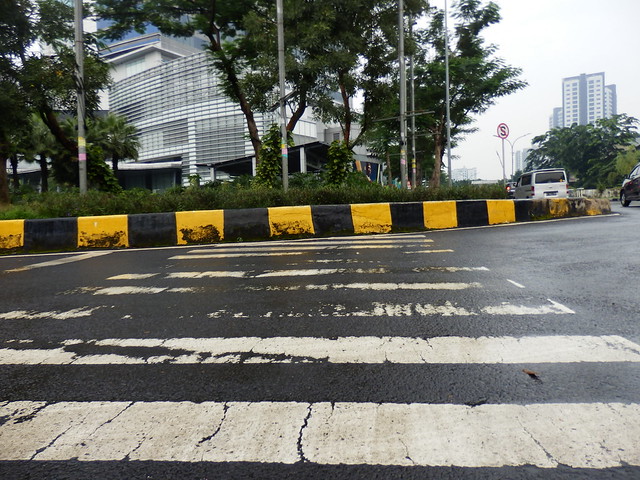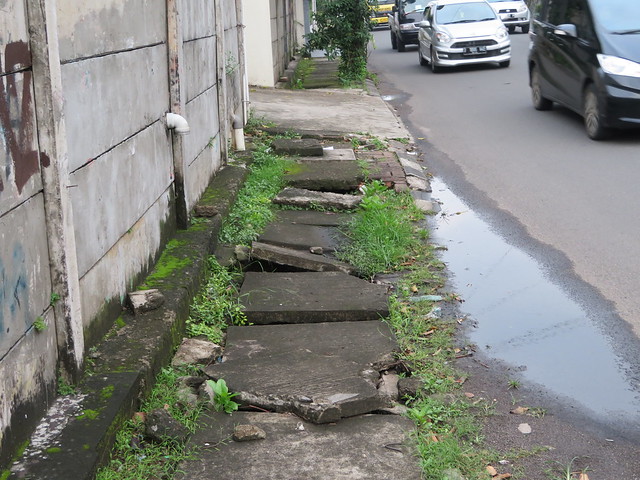I’ve been living in Indonesia for 10 years. I’ve travelled all over the world and It’s probably the least handicap accessible country I’ve ever been. There are lots of small steps everywhere and almost no ramps for wheelchairs. Even crosswalks will have steps and curbs rather than ramps, but what is really annoying is that the crosswalks are completely ignored by motorists. Drivers will literally speed up if they see a pedestrian try to cross the street. A taxi driver hit both me and my wife as we were walking in a crosswalk at a mall knocking both of us down spilling out groceries all over the street and badly scratching my wife’s hands and knees from falling down. I dragged the driver out of the car because he tried to flee the scene and the security at the mall acted more interested in protecting the driver from me kicking his ass than they were concerned that the asshole had just run us down. They offered no assistance to my injured wife and even refused to write up a report or call the police. They all just tried to have a big laugh about it and wanted us to think it was a big funny accident. My wife and I had to call the taxi company and report the incident to them. Luckily my wife had photographed the driver and the car. My wife is Indonesia and let them know in very colorful local dialect that she was totally pissed at the behavior of the security and the driver and pressed the issue until I think they got fired from their job for being so incompetent. Indonesian people will smile and laugh and be super friendly to your face most of the time, but that’s largely because they want to avoid conflict. They can be total assholes when driving or using basic common sense manners like waiting for people to exit before entering an elevator - they like to just walk right into each other and you will get bumped into constantly with no apologies.
Public transportation is nonexistent with exception to taxi or Grab. Jakarta does have a new railway system and some busses, Denpasar has some modern busses and Surabaya is starting a bus program, but none of them are very convenient and certainly not handicapped accessible.
Indonesians seem to hate walking - they will drive rather than walk 50 meters down the street, so there are very few real sidewalks here outside of major tourist areas, hotels and malls - and even n places where there are sidewalks, they are not always clear. Often they tend to be occupied by street vendors , parked cars and motorcycles, so a bit tricky to navigate if in a wheelchair, walker, cane or crutches.. Most “sidewalks” are just thin cement blocks covering open sewage drains - another person posted a photo of this already). I actually fell through one of these “sidewalks” and broke my knee. After that, It was very difficult getting around on crutches. Even in a fancy giant shopping mall where there where actually escalators and elevators, people will literally just walk right into you with no concern for your disability. I was almost knocked down by a man when I was clumsily attempting to open a doorway to enter a mall while fumbling with my crutches (rather than hold the door open for me or just open another door for himself, he Just forced his way though my door, and when I shouted at him and hit him with my crutches, he just gave me a blank stare as if he didn’t even realize he had just almost knocked me down.
Don’t expect any one to hold a door open for you here. Expect lots of smile and soft polite talk, but very rude actions.
 Working in Bali
Working in Bali Driving in Indonesia
Driving in Indonesia Having a baby in Indonesia
Having a baby in Indonesia Moving to Indonesia with your pet
Moving to Indonesia with your pet Accommodation in Bali
Accommodation in Bali Accommodation in Indonesia
Accommodation in Indonesia Buying property in Bali
Buying property in Bali Internships in Indonesia
Internships in Indonesia




